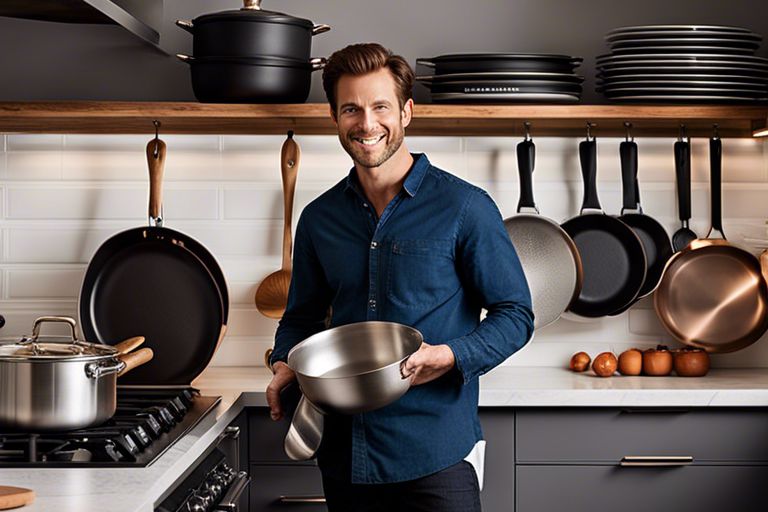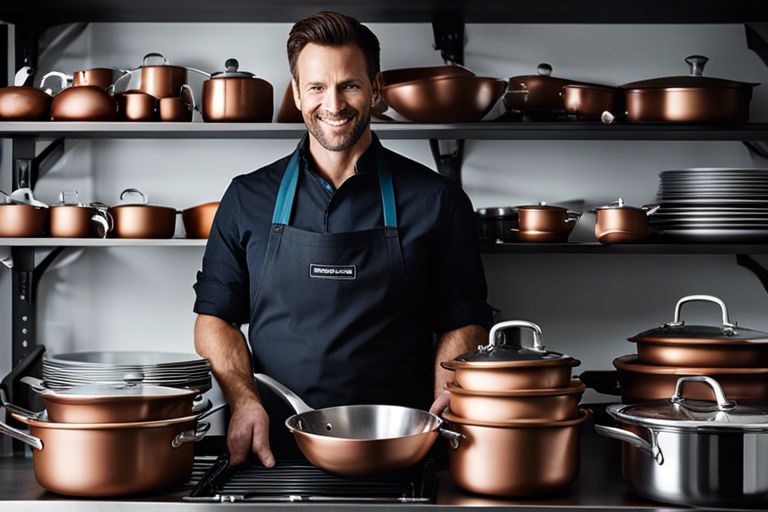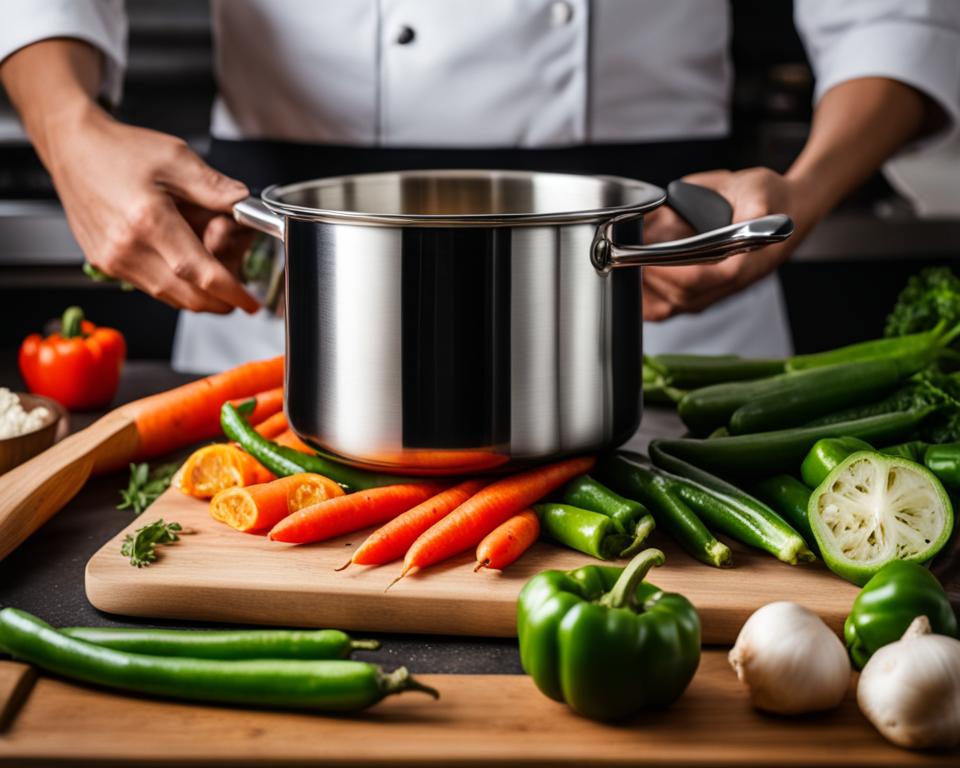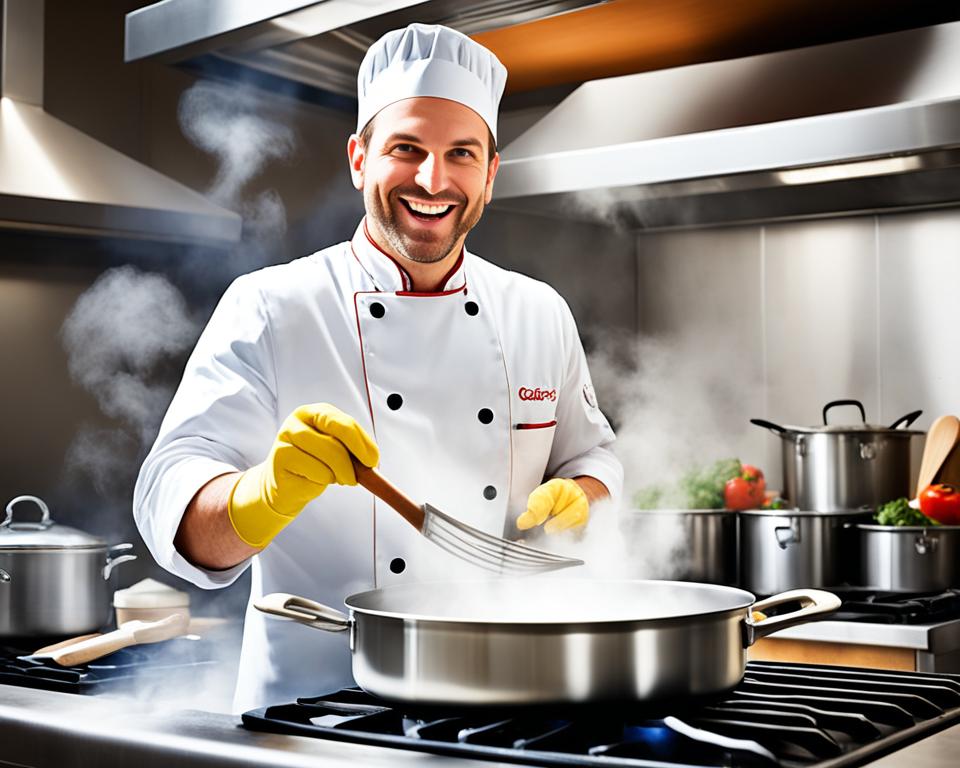Many aspiring home cooks face the daunting task of selecting the right cookware for their kitchen. With a plethora of options available, it’s important to make an informed decision to ensure your cooking experience is efficient and enjoyable. Understanding the key factors that determine the quality and performance of cookware can make all the difference in the meals you prepare.
Key Takeaways:
- Material Matters: Choose cookware made from stainless steel, cast iron, copper, or aluminum for durability and heat conductivity.
- Consider Cooking Surface: Non-stick coatings are great for delicate foods, while stainless steel is ideal for searing and browning.
- Handles and Weight: Opt for cookware with sturdy, ergonomic handles and a weight that feels comfortable for you to handle.
- Compatibility: Ensure the cookware is compatible with your cooking range, whether it’s gas, electric, or induction.
- Maintenance: Take into account the ease of cleaning and maintenance required for the cookware you choose.
Understanding Cookware Basics
The choice of cookware can significantly impact the outcome of your culinary creations. Understanding the basics of cookware is important in making an informed decision when selecting the best pots and pans for your kitchen.
Decoding Cookware Terminology
The world of cookware can be overwhelming with a plethora of terms and jargon. Decoding these terminologies can help you navigate through the options with ease. Terms like ‘non-stick’, ‘clad’, and ‘anodized’ are commonly used in the industry and understanding their meanings can guide you in choosing the right cookware for your cooking style and needs.
Differentiating Between Cookware Materials
Assuming all cookware is the same can be a costly mistake. Different cookware materials have varying heat conductivity, durability, and reactivity to certain foods. It’s crucial to know the differences between materials like stainless steel, cast iron, aluminum, and copper to select the best option for your cooking preferences and kitchen setup.
Plus, choosing the wrong material can potentially lead to health hazards, such as harmful chemicals leaching into your food or uneven cooking. Understanding the properties of each material can help you make a more informed decision that suits your cooking habits and dietary requirements.

Factors to Consider When Choosing Cookware
Some factors need to be taken into consideration when choosing cookware for your kitchen. The right type of cookware can enhance your cooking experience and ensure the best results for your dishes. Here are a few factors to keep in mind:
Assessing Heat Conductivity and Distribution
On assessing heat conductivity and distribution, it’s important to consider the material of the cookware. Copper and aluminum have excellent heat conductivity, while stainless steel may have uneven heat distribution. Look for cookware with multiple layers of materials to ensure even heat distribution across the cooking surface.
Matching Cookware to Cooking Techniques
Conductivity is a key factor when matching cookware to different cooking techniques. For example, cast iron is great for high-heat cooking methods like searing and frying, while non-stick pans are ideal for delicate foods that require low heat. Consider your cooking habits and the types of dishes you frequently prepare to choose cookware that complements your cooking style.
Heat control and retention are also important aspects to consider when matching cookware to cooking techniques. Some dishes may require precise temperature control, while others benefit from excellent heat retention. Make sure the cookware you choose aligns with your preferred cooking methods to achieve the best results in the kitchen.
Cookware Compatibility with Cooktops
Factors like the type of cooktop you have at home play a crucial role in determining the cookware compatibility. Induction cooktops require magnetic materials like cast iron or stainless steel for efficient heating. Gas and electric cooktops, on the other hand, are more versatile and can accommodate a wider range of cookware materials.
Plus, always check the manufacturer’s recommendations for cookware compatibility with your specific cooktop to avoid any potential damage or safety hazards in the kitchen. By choosing cookware that is compatible with your cooktop, you can ensure efficient cooking and prolong the lifespan of both your cookware and cooktop.
How-To Evaluate Cookware Quality
Keep in mind when evaluating cookware quality that the material plays a significant role in its performance and durability. If you’d like a detailed guide on different cookware materials, check out our Blog – Guide to Cookware Material – Best Pots & Pans … for more information.
Tips for Identifying High-Quality Cookware
- Look for durable materials such as stainless steel, cast iron, or copper.
- Check for even heat distribution to ensure your food cooks uniformly.
Knowing what to look for in high-quality cookware can save you time and money in the long run. By investing in premium materials, you can enjoy cooking for years to come.
Understanding the Significance of Thickness and Weight
Assuming you’ve narrowed down the material, understanding the importance of thickness and weight can further elevate your cooking experience. The thickness of the cookware affects how evenly it distributes heat, while the weight can indicate durability and heat retention capabilities.
Plus, thicker cookware tends to be more durable and less prone to warping under high heat, providing you with reliable performance. Investing in cookware with the right balance of thickness and weight can make a significant difference in your cooking results.
Considering Cookware Maintenance and Durability
Unlike selecting cookware based solely on appearance or price, considering maintenance and durability are crucial factors to ensure your investment lasts for years. For a comprehensive guide on choosing the best cookware, you can refer to The Essential Cookware Buying Guide.
How To Choose Dishwasher Safe Options
Cookware that is labeled as dishwasher safe can make your cleaning routine a breeze. Look for stainless steel and enameled cast iron options that are explicitly stated as safe for dishwasher use. Keep in mind that nonstick coatings may wear off faster with repeated dishwasher cleaning, so handwashing could be the better option to maintain their longevity.
Tips for Assessing Longevity and Warranty
Little details like the construction materials and warranty can give insights into the longevity of your cookware. Some high-quality brands offer lifetime warranties, indicating their confidence in the product’s durability. When assessing a warranty, check for terms covering defects in materials or workmanship. Any signs of a limited warranty should be taken into consideration before making a purchase.
- Material quality plays a significant role in determining the longevity of cookware.
- Warranty terms can provide assurance of the product’s durability.
- Check for clear warranty policies to avoid any surprises in the future.
Navigating Cookware Sets vs. Individual Pieces
To effectively navigate the world of cookware, one must decide between investing in a full set or purchasing individual pieces based on their cooking needs.
How To Determine What You Really Need
Determining the right cookware for your kitchen starts with assessing your cooking habits and lifestyle. Consider the type of dishes you frequently prepare, the number of people you typically cook for, and the cooking techniques you prefer.
The Pros and Cons of Buying Cookware Sets
What may seem like a convenient solution at first glance, cookware sets come with their own set of advantages and disadvantages. Below, we break down the pros and cons of purchasing a cookware set:
| Pros | Cons |
| Cost-effective | May include pieces you won’t use |
| Uniform look in the kitchen | Quality may vary among pieces |
| Convenience of having multiple pieces | Limitation in customization |
What aspiring chefs and home cooks need to remember is that investing in a cookware set may not always be the best option for everyone. While it offers convenience and cost-effectiveness, it may come with limitations that can impact the longevity and versatility of your kitchen arsenal. It’s vital to weigh the pros and cons carefully before making a decision that aligns with your cooking habits and preferences.
Special Considerations in Cookware Selection
Addressing Health and Safety Concerns
Once again, when choosing cookware, it is crucial to consider health and safety concerns. Some materials used in cookware can leach harmful chemicals into your food when exposed to high temperatures. To address this, opt for cookware made from safe materials such as stainless steel, cast iron, or ceramic. These materials are known for their durability and resistance to scratching and chipping, ensuring that no harmful substances end up in your dishes.
Choosing Cookware for Special Diets or Cooking Preferences
Even when choosing cookware for special diets or cooking preferences, it is crucial to consider the material of the cookware. For example, non-stick cookware is ideal for those on a low-fat diet as it requires less oil for cooking. Alternatively, cast iron cookware is perfect for those looking to increase their iron intake through cooking.
To ensure your cookware aligns with your dietary needs and cooking preferences, it is important to consider the type of cuisine you most frequently prepare. Whether you are a stir-fry enthusiast or a baking aficionado, selecting the right cookware can enhance the flavors and textures of your dishes.
Putting It All Together: How To Make The Best Purchase
How-To Compile Your Cookware Research
Purchasing new cookware can be overwhelming with the array of options available in the market. It is crucial to compile your research before making a decision. Start by identifying your cooking needs and preferences. Consider the types of meals you frequently prepare and the cooking techniques you use. This will help narrow down the material and type of cookware that will best suit your requirements.
Tips for Comparing Prices and Finding the Best Deals
With so many retailers and brands offering cookware, it is important to compare prices and look for the best deals. Start by setting a budget for your cookware purchase. Research online and in-store to compare prices for the specific brands and models you are interested in. Look out for promotions, discounts, and seasonal sales to get the best value for your money.
- Compare prices: Research and compare prices to ensure you are getting the best deal.
- Look for promotions: Keep an eye out for promotions and discounts to maximize savings on your cookware purchase.
- Seasonal sales: Take advantage of seasonal sales to get the best value for your money.
- Thou shalt not overlook hidden costs like shipping and taxes that can impact the final price.
Understanding
| Important Details | Dangerous Details |
|---|---|
| Research and compare prices | Don’t fall for deceptive marketing tactics |
| Set a budget | Be cautious of counterfeit products |
| Look for promotions and discounts | Read customer reviews for product feedback |
Final Words
On the whole, selecting the perfect cookware for your kitchen can greatly enhance your cooking experience and results. By considering factors such as material, durability, heat conductivity, ease of maintenance, and cooking habits, you can make an informed decision on which cookware best suits your needs. Whether you prefer stainless steel, non-stick, cast iron, or copper cookware, finding the ideal set can elevate your culinary skills and make meal preparation more enjoyable.
FAQ
Q: Why is choosing the right cookware important?
A: Choosing the right cookware is important because it affects the taste of your food, cooking efficiency, and the overall cooking experience.
Q: What are the different types of cookware materials available?
A: Some common types of cookware materials include stainless steel, cast iron, aluminum, non-stick, and copper.
Q: What factors should I consider when choosing cookware?
A: When choosing cookware, consider factors such as heat conductivity, durability, maintenance, and compatibility with your cooking style.
Q: How do I determine the right size of cookware for my needs?
A: Determine the right size of cookware by considering the number of people you usually cook for and the capacity you need for your recipes.
Q: How can I maintain and prolong the life of my cookware?
A: To maintain and prolong the life of your cookware, follow the manufacturer’s instructions for cleaning and storage, avoid using metal utensils on non-stick surfaces, and avoid sudden temperature changes.



